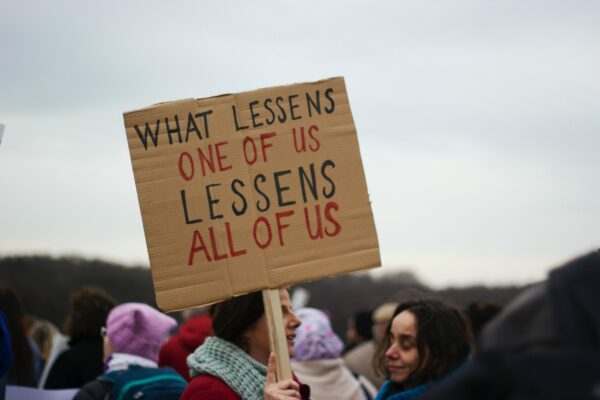
On June 23, 2021, the Equal Futures Network in partnership with the Enchanté Network hosted a 90-minute Incubator Session bringing organizations together to discuss moving beyond the binary by deconstructing concepts of gender and the use of gendered language in Canada.
Participants heard presentations from representatives of the Enchanté Network, the Edmonton 2 Spirit Society and le JAG who provided context for the discussion and shared organizational best practices and lessons learned. A total of 73 participants attended the session and participated in the breakout rooms. Here is what we heard:
AREAS IN NEED OF TARGETED SUPPORT
Advancing gender equity in Canada requires us to not only focus on closing existing gaps between men and women but also examine how to deconstruct binary concepts of gender and including a diversity of voices, experiences and perspectives in all the work that we do. How we think, speak and communicate about gender plays an important role in advancing social justice work and creating spaces that are inclusive for all.
At the organizational level, there is critical work that needs to be done to close gender gaps, eliminate stereotypes and revolutionize the way we understand and talk about gender. Addressing how language, organizational structures, and data and research are rooted in binary and colonial understandings of gender are paramount in order to move forward in a way that is inclusive of trans, gender diverse and Two Spirit identities.
BEST PRACTICES
- Inclusive Language:
- As a sector, there is a need to shift language away from “men and women” and replace it with more gender-neutral terms. This is particularly important for those providing frontline services with staff who interact with clients to ensure that these spaces are gender affirming.
- It is important to recognize the harm that comes from using gendered language. Trans, non-binary and Two Spirit individuals face additional barriers as result of society’s default use of gendered language which makes inclusive language even more important for their safety and well-being.
- Where can you start? A good place to begin is by looking at documents, forms and questionnaires, and other communication materials (both internal and external facing) to see what adjustments can be made to make the language more inclusive. It is also important to recognize that learning is a journey and that revisiting these materials on a regular basis is good practice to ensure that the language is inclusive and up to date.
- Organizational Restructuring:
- Beyond language, organizations should review and update programming, policies and services to be reflective of the populations being served. This is work that needs to be undertaken at all levels of the organization, including at the board level.
- Organizations need to be clear about how the systems they work within and are creating support lasting change in behaviour and norms. Change needs to be instituted at the organizational level to make spaces safe and inclusive for all.
- There is a need for gender inclusive programming and services – hire trans and gender diverse people to do this work!
- Capacity Strengthening:
- Provide training opportunities, support services and create other learning spaces that promote an organizational culture of openness, transparency and inclusivity.
- Create policies and procedures that allow for restorative justice and conflict mediation.
- Be aware of who is holding space, who should be leading spaces and be mindful not to speak on behalf of a particular community and do not take up space that is not yours.
- Decolonization and Reconciliation:
- Take a critical lens to the ways in which you work and examine how they are informed by colonial frameworks and practices. Question if there are other ways of knowing and being that could better inform the work being done and acknowledge that there are many diverse ways of understanding gender. For example, while it may be best practice to include pronouns in our work, we should also be mindful that this might not be reflective of Indigenous languages that might not use pronouns.
- Being mindful of the roles that colonization plays in erasing gender diversity for Indigenous communities is paramount in ensuring that gender equity and social justice work is inclusive, informed and helps to advance the path of reconciliation.
CRITICAL GAPS AND KEY CHALLENGES
- Language:
- There is a challenge when it comes to having this conversation in French as the French language is very gendered which makes it difficult to make changes and move towards being more inclusive. Check out our resource section to learn more!
- Tensions within the movement:
- There is a lot of tension between women’s movements and the 2SLGTBQ+ community. At times, there is an uphill challenge to move towards spaces, programming, services and membership that are more inclusive especially when movements/organizations are rooted in past understandings that are very binary. This excludes gender-diverse community members from participating in programming and accessing services. Our feminism is inclusive of trans and gender diverse peoples. As a network, we strive to include, uplift and amplify trans, 2 Spirit and gender diverse realities.
- Data and Research:
- As a sector, there is a need to move towards gender inclusive data and data collection. This is paramount to inform policy, practices, spaces, services and programs. Additionally, there is a need for a more in-depth exploration of the inclusion of Two Spirit identities and how we can allow their identity to remain intact rather than partially represented in response to gender-related questions in data collection.
WHERE DO WE GO FROM HERE?
Moving beyond the binary is a critical component of advancing gender equality for everyone locally and globally. In order to move forward there is a need to:
- Educate Yourself!
- Seek to understand the varying contexts and intersectional impacts of lack of safety nets, limited access to resources, marginalization, homophobia, colonization, intergenerational trauma and much more. Click here for more resources.
- Get involved with Local Movements!
- Local movements need to be intersectional and informed by people with lived experience. These movements should be co-created with community members who are most affected by systemic gender inequalities. Find an organization in your area by using our new interactive map!
- Listen to Diverse Voices!
Instead of occupying space, listen and amplify diverse voices, experiences and perspectives and don’t occupy space that is not yours to be in.
ADDITIONAL RESOURCES
- www.e2s.ca (ENG)
- www.enchantenetwork.ca (ENG)
- www.lejag.org (FR)
- Power & Pride: Supporting women, Two-Spirit, and LGBTQ+ individuals to stand for rural local government
- Wisdom2Action – Trans Inclusion in Practice (ENG and FR)
- Out Saskatoon – Queer Terminology (ENG)
- Out Saskatoon – Two Spirit (ENG)
- Edmonton 2Spirit Society – Two-Spirit Resources (ENG)
- Le Jag – Documentation / Resources (FR)
- Canadian Centre for Gender and Sexual Diversity – Resources (ENG)
- Egale Canada – Inclusive and Affirming Language (ENG and FR)
- Egale Canada – Pronoun Usage Guide (ENG)
- Egale Canada – LGBTQI2S Glossary of Terms (ENG/FR)
- Resource: https://www.cbc.ca/player/play/1912237635686
- CBRC: https://www.cbrc.net
- https://www.wisdom2action.org/transinclusion/
- https://www.instagram.com/p/CQYjNxCNUJ0/
- https://www.instagram.com/p/CP6E07StOoR/
- https://www.instagram.com/p/CPvWatLNNUw/
- https://www.youtube.com/playlist?list=PLlfj8DUsEAUrpiONH3-wgV5NExKS0aGY7
- www.transwellness.ca
The Equal Futures Network acknowledges that Indigenous people are the traditional guardians of Turtle Island, on the land also known as Canada






